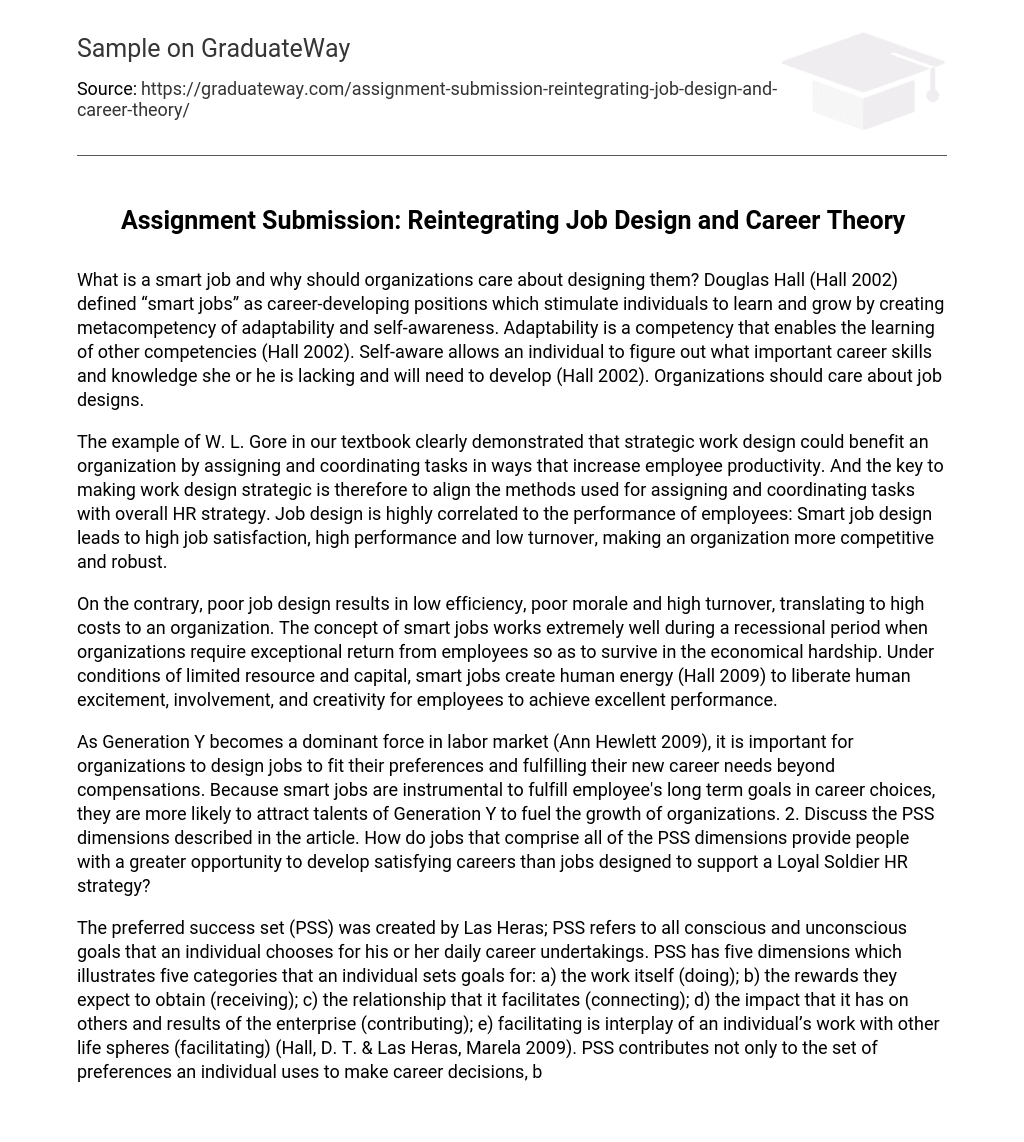What is a smart job and why should organizations care about designing them? Douglas Hall (Hall 2002) defined “smart jobs” as career-developing positions which stimulate individuals to learn and grow by creating metacompetency of adaptability and self-awareness. Adaptability is a competency that enables the learning of other competencies (Hall 2002). Self-aware allows an individual to figure out what important career skills and knowledge she or he is lacking and will need to develop (Hall 2002). Organizations should care about job designs.
The example of W. L. Gore in our textbook clearly demonstrated that strategic work design could benefit an organization by assigning and coordinating tasks in ways that increase employee productivity. And the key to making work design strategic is therefore to align the methods used for assigning and coordinating tasks with overall HR strategy. Job design is highly correlated to the performance of employees: Smart job design leads to high job satisfaction, high performance and low turnover, making an organization more competitive and robust.
On the contrary, poor job design results in low efficiency, poor morale and high turnover, translating to high costs to an organization. The concept of smart jobs works extremely well during a recessional period when organizations require exceptional return from employees so as to survive in the economical hardship. Under conditions of limited resource and capital, smart jobs create human energy (Hall 2009) to liberate human excitement, involvement, and creativity for employees to achieve excellent performance.
As Generation Y becomes a dominant force in labor market (Ann Hewlett 2009), it is important for organizations to design jobs to fit their preferences and fulfilling their new career needs beyond compensations. Because smart jobs are instrumental to fulfill employee’s long term goals in career choices, they are more likely to attract talents of Generation Y to fuel the growth of organizations. 2. Discuss the PSS dimensions described in the article. How do jobs that comprise all of the PSS dimensions provide people with a greater opportunity to develop satisfying careers than jobs designed to support a Loyal Soldier HR strategy?
The preferred success set (PSS) was created by Las Heras; PSS refers to all conscious and unconscious goals that an individual chooses for his or her daily career undertakings. PSS has five dimensions which illustrates five categories that an individual sets goals for: a) the work itself (doing); b) the rewards they expect to obtain (receiving); c) the relationship that it facilitates (connecting); d) the impact that it has on others and results of the enterprise (contributing); e) facilitating is interplay of an individual’s work with other life spheres (facilitating) (Hall, D. T. & Las Heras, Marela 2009). PSS contributes not only to the set of preferences an individual uses to make career decisions, but also to the goal that an individual has in his or her daily career efforts. Loyal Soldiers (Internal cost strategy) are low cost workforce developed within an organization. In order to support this type of HR strategy, the organization needs to reduce the complexity of jobs by dividing them into simple tasks that require minimum skills/knowledge or little training.
From a job design perspective, Loyal Solider HR strategy concentrates on job differentiations while minimizing integrations. Under this circumstance, the jobs for Loyal Solider might lack of balance in terms of five PSS dimensions. Overly simplified tasks generally comprise of a large amount of doing (such as repetitive physical work) and a low amount of receiving (such as minimum wage). Because Loyal Solders only perform clearly defined tasks, they have very few, if any, involvement in terms of connecting and facilitating.
Due to their low ranks in organizations, they have limited vision of their contributions to the business operation. Most importantly, there are inadequate opportunities for Loyal Soldiers to move up in their career ladders, resulting in higher turnover ratios. On the other hand, jobs comprise all of the PSS dimensions are superior because these jobs allow employees to meet their goals in any or all of the five dimensions (doing, receiving, contributing, connecting, and facilitating). And fulfilling of these personal goals will give employees more intrinsic motivation and less demand on extrinsic rewards.
Hence, redesigning jobs with PSS dimensions can make jobs more productive, more fulfilling, and more learning-inducing to their holders. As employees expand their roles with more responsibilities and accountabilities, they meet their need for mastery, integration, and autonomy. When employees’ work is highly valued by organizations, overall quality and satisfaction of job are greatly improved. Conversely, when PSS is not met, employees tend to focus on the receiving dimension, specifically compensations, prospects for promotion and job security.
This could be costly for both employees and organizations, because employees will require higher compensations from organizations to make up for lower intrinsic motivations, causing financial and productivity losses to organizations. PSS dimension allows individuals to define success for themselves and offers them many more career options so that there is a far greater chance than traditional jobs to meet the career interests of an increasingly diversified and dynamic workforce. Smart jobs also offer more potential for career advancement than traditional lifetime-loyalty model does.
Reference:
- Hall, D. T. (2002). Careers in and out of organizations. London: sage Hall, D. T. & Las Heras, Marela (2009).
- Reintegrating job design and career theory: Creating not just good jobs but smart jobs. John Wiley & Sons, Ltd. Ann Hewlett, Sylvia (2009).
- What motivates Gen Y and boomer talents? Harvard Business Publishing





